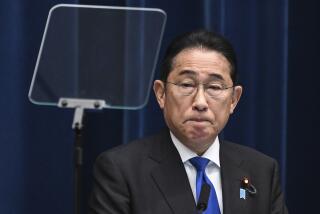Majority Out of Reach for Japan’s Ruling Party : Politics: The Liberal Democrats admit they will fall short in upper house election in July. They look to ’95 to regain control.
TOKYO — Japan’s ruling party has already abandoned hope of restoring in next July’s election the majority in the upper house of Parliament that it lost three years ago, Tamisuke Watanuki, secretary general of the ruling Liberal Democratic Party, said Thursday.
“Our strategy is to restore the majority in the election three years from now,” the party’s No. 2 executive said.
Watanuki noted that only 40 upper house Liberal Democrats with six-year terms don’t have to stand for reelection in the July balloting, in which 126, or half of the 252 seats, will be at stake.
“That means we would have to win 87 seats to get a majority. But we will only have 82 candidates. Even if all of them are elected, we wouldn’t regain a majority,” he said over lunch with a group of foreign correspondents.
The goal for the election, which is expected to be held July 26, will be to return all 75 incumbents up for reelection, he said. That would leave the party with 115 seats, 12 short of a majority but well within striking distance to recover a majority in 1995.
Watanuki also dismissed any possibility of the ruling party’s breaking up after the upper house vote, despite repeated remarks by Shin Kanemaru, the party’s vice president, that a “realignment” of political parties might be carried out.
“I told Kanemaru to stop making those statements because they could hurt the election outcome,” Watanuki said.
With the ruling party holding a solid majority in the lower house of Parliament, which elects the prime minister, “I don’t think (a political realignment) will occur,” he said. Nor, he added, is there any possibility that the party will seek the resignation of Prime Minister Kiichi Miyazawa if it suffers an unexpected setback in the July election.
Watanuki said Miyazawa might dissolve the lower house and schedule a general election to coincide with the upper house balloting “if the opposition uses force (in Parliament)” to prevent a vote on bills authorizing sending Japanese armed forces abroad to participate in disaster relief and U.N. peacekeeping operations.
Based on experience, a “double election” would improve the ruling party’s showing in the upper house balloting.
Watanuki acknowledged that Miyazawa has fared poorly in opinion polls but said the prime minister has been tied up with proceedings in Parliament until now.
“Miyazawa hasn’t taken off yet. He needs to get off the ground,” he said. But with a trip to Europe from April 28 to May 2 and the seven-nation economic summit in Munich on July 6-8, “Miyazawa will now be able to perform in the arena--diplomacy--in which expectations for him have been the highest.”
More to Read
Sign up for Essential California
The most important California stories and recommendations in your inbox every morning.
You may occasionally receive promotional content from the Los Angeles Times.










